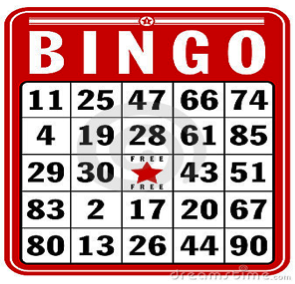Encyclopedia Dubuque
"Encyclopedia Dubuque is the online authority for all things Dubuque, written by the people who know the city best.”
Marshall Cohen—researcher and producer, CNN
Affiliated with the Local History Network of the State Historical Society of Iowa, and the Iowa Museum Association.
BINGO
BINGO. Prior to 1973, strict laws forbid even the simplest forms of gambling. In 1838 the founding of Iowa Territory came at a time of a strong movement against lotteries. These had been used since colonial time as a way to finance public projects. Fraud in the lotteries and the problem of compulsive gambling led in 1833 to the abolition of lotteries in Pennsylvania, New York and Massachusetts. By the time of the CIVIL WAR only Delaware, Kentucky and Missouri still had lotteries with the last legal lottery abolished in 1894.
The Iowa Territorial Assembly in 1838 passed Iowa's first anti-gambling statute. In 1843 the Assembly added a ban on lotteries and the sale of lottery tickets. In the decision of P.& C Guenther v. Dewein, the Iowa Supreme Court in 1860 stated:
The reason and policy of this constitutional
provision and this statute...is found in the
preamble to New York Act upon the same subject
...'Whereas experience has proved that private
lotteries occasion idleness and dissipation,
and have been productive of frauds and impositions.'
Although the Iowa Supreme Court remained constant in its opposition to lotteries, the general public by 1950 had come to accept one form of lottery--bingo. Nationwide, state referendums began to permit the game. The Iowa Legislature began to see attempts to amend the constitutional prohibition on lotteries in 1953.
During the first session of the 63rd General Assembly (1969) Representative Theodore Richards ELLSWORTH introduced a resolution to permit a charitable bingo amendment. Despite its critics, the House voted 73-43 to repeal the constitutional ban on lotteries. The Senate voted 36-21. During the 64th General Assembly (1971) the amendment passed the House by 59-25.
A crackdown on carnival games at the Iowa State Fair in 1972 by Iowa Attorney General Richard Turner and his raid on a church picnic at Buena Vista brought the issue to the Iowa Senate. On March 22, 1972 the Senate, after debate, voted to pass the resolution by 26-23.
Support for the amendment prior to the referendum soared. Governor Robert Ray pledged his support and finally the Iowa Attorney General who saw his raids hurting his chances for re-election. Andrew FROMMELT announced the formation in Dubuque of the Citizens for Legal Bingo. By July both the Democratic candidates for governor and Turner's Democratic opponent were expressing their support as well.
On November 7, 1972 67.13 percent of the voters voted in favor of the amendment. Of Iowa's ninety-nine counties, only Osceola and Sioux counties were in opposition. The General Assembly the following year legalized bingo and fair games.
---
Source:
Richard, Lord Acton and Patricia Nassif Acton, To Go Free: A Treasury of Iowa's Legal Heritage, Ames: Iowa State University Press, 1995, p. 313-322


